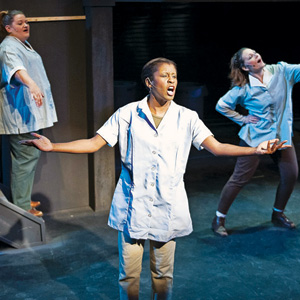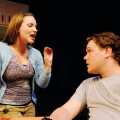America doesn’t have a single voice; you couldn’t get every person to agree on a topic, and why would you want to? The beauty of the country is the multitude of opinions, perspectives and experiences. Studs Terkel, an oral historian, understood this, and his books feature interviews with people from all walks of life. Foothill Music Theatre’s production of Working, a musical adaptation of Terkel’s book, takes the same broad socioeconomic approach and looks at where, how and, most importantly, why people work. The result is an ambitious cross-section of American life.
The structure of the play relies on a series of vaguely connected scenes, monologues and songs where characters reflect on their profession. Since the majority of the words (the production, adapted for the stage by Stephen Schwartz and Nina Faso in 1978, adds minor dialogue and songs) come directly from the interviewees in Terkel’s book, the show functions as a spoken-word documentary backed by a variety of musical styles and choreography (Michael Ryken).
The driving force is the characters’ unique views of their professions and lots in life. From this, grows an honest and vulnerable disclosure without conclusion or judgment. An ironworker (Peter K. Owen) admonishes anyone who says that “a man is just a laborer, a woman just a housewife.” This idea, echoed by Lovin’ Al (Russell E. Johnson), a lifetime parking lot attendant, is countered by a fourth-generation cleaning woman, Maggie Holmes (‘Nique Genelle), who vows that her daughter will have a better job.
Every job provides a service; this play examines the service’s value that both the workers and society place on a profession. Al takes great pride in doing his job well; the cleaning woman looks down on her own line of work. With an amazing stage presence and singing voice, Linda Piccone plays Rose Hoffman, a longtime schoolteacher who desperately wants to be an asset to her students but is unsure of her effectiveness after so many years.
Turning this oral history into a musical is not always effective as the backup dancers and singers rarely add to the character’s words, instead burying them in—albeit fun—choreography. In addition, with a cast of more than 20 people playing 32 characters, director Milissa Carey often has to crowd the black-box stage with bodies. Many scenes slide along nicely with four to six additional singers or dancers, but when a dozen or more people are present it becomes jumbled. The resulting tangle of voices and opinions succeeds as a perfect metaphor for Terkel’s work and America, but it doesn’t work as staging. Still, it’s only a minor road bump on an otherwise fascinating journey across America that is as relevant today as it was decades ago.
Working
Through March 6
Foothill College
Los Altos Hills
$13-$26

 San Jose Stage: ‘On the Waterfront’
San Jose Stage: ‘On the Waterfront’ 


